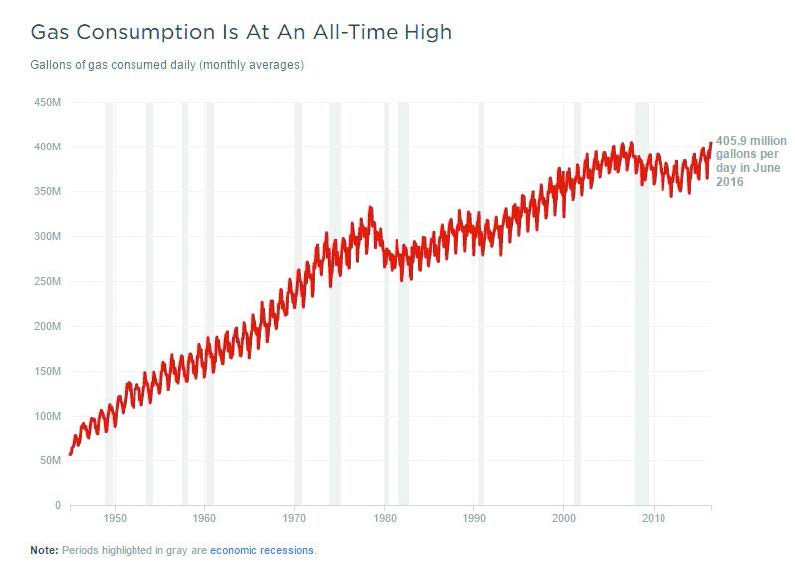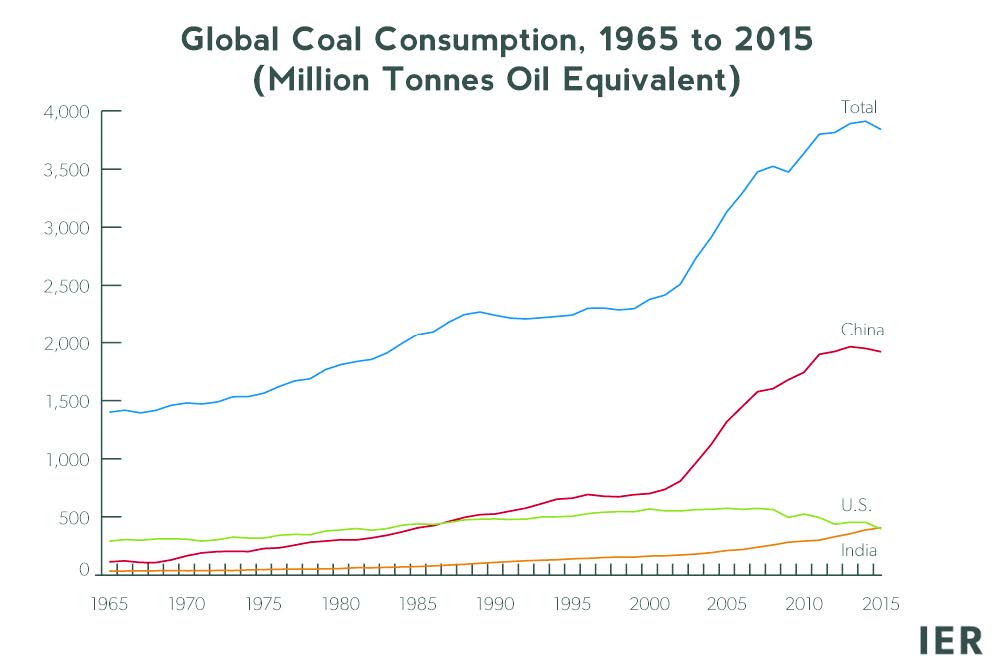Is this Jevons Paradox?
Dr. Edward P. Becker | TLT Automotive Tribology December 2016
2016 could set the record for highest gasoline consumption.
ACCORDING TO THE U.S. ENERGY INFORMATION ADMINISTRATION, monthly gasoline consumption reached an all-time high of 9,664,000 barrels (over 405 million gallons) per day in June of this year, and annual consumption is on track to make 2016 the year of highest gasoline consumption, eclipsing the 2007 record. This news was greeted with a fair amount of surprise—and even alarm in many circles—but not by STLE members who attended the 2014 Annual Meeting.
Flashback to the keynote address by Dr. Don Hillebrand from Argonne National Laboratory. Titled Advanced Vehicle Technology Research, the talk covered such fascinating subjects as vehicle electrification, advanced combustion, alternative fuels and autonomous vehicles.
Regarding fuel efficiency, Dr. Hillebrand introduced the concept of Jevons Paradox, which states that as technology progresses, the increase in efficiency with which a resource is used tends to increase (rather than decrease) the rate of consumption of that resource. Figure 1 clearly shows the upward trend in gasoline consumption since at least 1946, and the few dips in the curve correspond with economic recessions rather than any leap in legislation or technology.
 Figure 1. Gasoline consumption in the U.S. (Figure courtesy of NPR. Available at www.npr.org/2016/09/02/492271953/u-s-gasoline-use-hits-a-record-but-that-may-not-last.)
Figure 1. Gasoline consumption in the U.S. (Figure courtesy of NPR. Available at www.npr.org/2016/09/02/492271953/u-s-gasoline-use-hits-a-record-but-that-may-not-last.)
Some sources go so far as to suggest that the increase is temporary and may not last (
1). Surely, they argue, the cause is the current relatively low price of gasoline ($2.18 per gallon of regular unleaded, as of this writing) (
2). While these prices are certainly a relief to many, on an inflation-adjusted basis, the price has been much higher ($3.80 per gallon in 2012) and much lower ($1.52 in 1998), according to the U.S. Energy Information Administration (
3). In fact, the evidence suggests that, barring a recession, increasing gasoline prices may slow the growth of consumption, but consumption rises nonetheless.
So is Jevons Paradox an inescapable force of nature? Probably not. What is required is a disruptive break in technology. For example, sending facsimiles over telephone lines is very inexpensive, but when is the last time you sent or received a fax? Global demand for motorized transportation will rise, but the means of propulsion may vary. Already we have seen robust growth in alternative fuels for combustion engines (ethanol and natural gas) as well as electric vehicles (hybrids and full-time electrics).
The actual context of Jevons Paradox was in relation to the use of coal during the industrial revolution. In his 1865 book The Coal Question, economist William Jevons noted that advances in the efficiency of steam engines resulted in a dramatic increase in the use of coal. Coal is now primarily used to generate electricity and, as Figure 2 shows, the global demand does follow an upward trend until quite recently. However, in 2015 global use of coal actually decreased. The cause cannot be attributed to any economic downturn but rather the combined effect of numerous alternative ways of providing electricity including nuclear, natural gas, solar energy and wind energy.
 Figure 2. Global coal consumption (Figure courtesy of Institute for Energy Research. Available at http://instituteforenergyresearch.org/analysis/global-coal-consumption-fell-2015-oils-market-share-rose-16-year-high/.)
Figure 2. Global coal consumption (Figure courtesy of Institute for Energy Research. Available at http://instituteforenergyresearch.org/analysis/global-coal-consumption-fell-2015-oils-market-share-rose-16-year-high/.)
So perhaps the day when gasoline follows a similar trend is not far off.
REFERENCES
1.
See
www.npr.org/2016/09/02/492271953/u-s-gasoline-use-hits-a-record-but-that-may-not-last.
2.
See
http://gasprices.aaa.com.
3.
See
www.eia.gov/forecasts/steo/realprices.
 Ed Becker is an STLE Fellow and past president. He is president of Friction & Wear Solutions, LLC, in Brighton, Mich., and can be reached through his website at www.frictionandwearsolutions.com
Ed Becker is an STLE Fellow and past president. He is president of Friction & Wear Solutions, LLC, in Brighton, Mich., and can be reached through his website at www.frictionandwearsolutions.com.